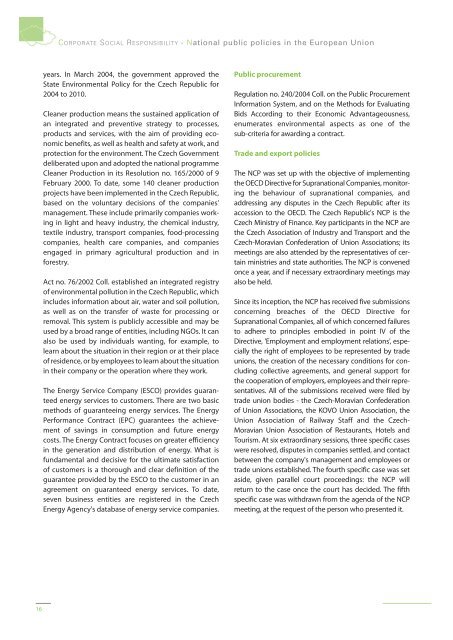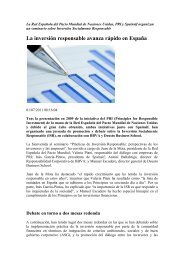Corporate Social Responsibility National public policies in the ...
Corporate Social Responsibility National public policies in the ...
Corporate Social Responsibility National public policies in the ...
You also want an ePaper? Increase the reach of your titles
YUMPU automatically turns print PDFs into web optimized ePapers that Google loves.
CORPORATE SOCIAL RESPONSIBILITY - <strong>National</strong> <strong>public</strong> <strong>policies</strong> <strong>in</strong> <strong>the</strong> European Union<br />
years. In March 2004, <strong>the</strong> government approved <strong>the</strong><br />
State Environmental Policy for <strong>the</strong> Czech Re<strong>public</strong> for<br />
2004 to 2010.<br />
Cleaner production means <strong>the</strong> susta<strong>in</strong>ed application of<br />
an <strong>in</strong>tegrated and preventive strategy to processes,<br />
products and services, with <strong>the</strong> aim of provid<strong>in</strong>g economic<br />
benefits, as well as health and safety at work, and<br />
protection for <strong>the</strong> environment. The Czech Government<br />
deliberated upon and adopted <strong>the</strong> national programme<br />
Cleaner Production <strong>in</strong> its Resolution no. 165/2000 of 9<br />
February 2000. To date, some 140 cleaner production<br />
projects have been implemented <strong>in</strong> <strong>the</strong> Czech Re<strong>public</strong>,<br />
based on <strong>the</strong> voluntary decisions of <strong>the</strong> companies'<br />
management. These <strong>in</strong>clude primarily companies work<strong>in</strong>g<br />
<strong>in</strong> light and heavy <strong>in</strong>dustry, <strong>the</strong> chemical <strong>in</strong>dustry,<br />
textile <strong>in</strong>dustry, transport companies, food-process<strong>in</strong>g<br />
companies, health care companies, and companies<br />
engaged <strong>in</strong> primary agricultural production and <strong>in</strong><br />
forestry.<br />
Act no. 76/2002 Coll. established an <strong>in</strong>tegrated registry<br />
of environmental pollution <strong>in</strong> <strong>the</strong> Czech Re<strong>public</strong>, which<br />
<strong>in</strong>cludes <strong>in</strong>formation about air, water and soil pollution,<br />
as well as on <strong>the</strong> transfer of waste for process<strong>in</strong>g or<br />
removal. This system is <strong>public</strong>ly accessible and may be<br />
used by a broad range of entities, <strong>in</strong>clud<strong>in</strong>g NGOs. It can<br />
also be used by <strong>in</strong>dividuals want<strong>in</strong>g, for example, to<br />
learn about <strong>the</strong> situation <strong>in</strong> <strong>the</strong>ir region or at <strong>the</strong>ir place<br />
of residence, or by employees to learn about <strong>the</strong> situation<br />
<strong>in</strong> <strong>the</strong>ir company or <strong>the</strong> operation where <strong>the</strong>y work.<br />
The Energy Service Company (ESCO) provides guaranteed<br />
energy services to customers. There are two basic<br />
methods of guarantee<strong>in</strong>g energy services. The Energy<br />
Performance Contract (EPC) guarantees <strong>the</strong> achievement<br />
of sav<strong>in</strong>gs <strong>in</strong> consumption and future energy<br />
costs. The Energy Contract focuses on greater efficiency<br />
<strong>in</strong> <strong>the</strong> generation and distribution of energy. What is<br />
fundamental and decisive for <strong>the</strong> ultimate satisfaction<br />
of customers is a thorough and clear def<strong>in</strong>ition of <strong>the</strong><br />
guarantee provided by <strong>the</strong> ESCO to <strong>the</strong> customer <strong>in</strong> an<br />
agreement on guaranteed energy services. To date,<br />
seven bus<strong>in</strong>ess entities are registered <strong>in</strong> <strong>the</strong> Czech<br />
Energy Agency's database of energy service companies.<br />
Public procurement<br />
Regulation no. 240/2004 Coll. on <strong>the</strong> Public Procurement<br />
Information System, and on <strong>the</strong> Methods for Evaluat<strong>in</strong>g<br />
Bids Accord<strong>in</strong>g to <strong>the</strong>ir Economic Advantageousness,<br />
enumerates environmental aspects as one of <strong>the</strong><br />
sub-criteria for award<strong>in</strong>g a contract.<br />
Trade and export <strong>policies</strong><br />
The NCP was set up with <strong>the</strong> objective of implement<strong>in</strong>g<br />
<strong>the</strong> OECD Directive for Supranational Companies, monitor<strong>in</strong>g<br />
<strong>the</strong> behaviour of supranational companies, and<br />
address<strong>in</strong>g any disputes <strong>in</strong> <strong>the</strong> Czech Re<strong>public</strong> after its<br />
accession to <strong>the</strong> OECD. The Czech Re<strong>public</strong>'s NCP is <strong>the</strong><br />
Czech M<strong>in</strong>istry of F<strong>in</strong>ance. Key participants <strong>in</strong> <strong>the</strong> NCP are<br />
<strong>the</strong> Czech Association of Industry and Transport and <strong>the</strong><br />
Czech-Moravian Confederation of Union Associations; its<br />
meet<strong>in</strong>gs are also attended by <strong>the</strong> representatives of certa<strong>in</strong><br />
m<strong>in</strong>istries and state authorities. The NCP is convened<br />
once a year, and if necessary extraord<strong>in</strong>ary meet<strong>in</strong>gs may<br />
also be held.<br />
S<strong>in</strong>ce its <strong>in</strong>ception, <strong>the</strong> NCP has received five submissions<br />
concern<strong>in</strong>g breaches of <strong>the</strong> OECD Directive for<br />
Supranational Companies, all of which concerned failures<br />
to adhere to pr<strong>in</strong>ciples embodied <strong>in</strong> po<strong>in</strong>t IV of <strong>the</strong><br />
Directive, 'Employment and employment relations', especially<br />
<strong>the</strong> right of employees to be represented by trade<br />
unions, <strong>the</strong> creation of <strong>the</strong> necessary conditions for conclud<strong>in</strong>g<br />
collective agreements, and general support for<br />
<strong>the</strong> cooperation of employers, employees and <strong>the</strong>ir representatives.<br />
All of <strong>the</strong> submissions received were filed by<br />
trade union bodies - <strong>the</strong> Czech-Moravian Confederation<br />
of Union Associations, <strong>the</strong> KOVO Union Association, <strong>the</strong><br />
Union Association of Railway Staff and <strong>the</strong> Czech-<br />
Moravian Union Association of Restaurants, Hotels and<br />
Tourism. At six extraord<strong>in</strong>ary sessions, three specific cases<br />
were resolved, disputes <strong>in</strong> companies settled, and contact<br />
between <strong>the</strong> company's management and employees or<br />
trade unions established. The fourth specific case was set<br />
aside, given parallel court proceed<strong>in</strong>gs: <strong>the</strong> NCP will<br />
return to <strong>the</strong> case once <strong>the</strong> court has decided. The fifth<br />
specific case was withdrawn from <strong>the</strong> agenda of <strong>the</strong> NCP<br />
meet<strong>in</strong>g, at <strong>the</strong> request of <strong>the</strong> person who presented it.<br />
16








